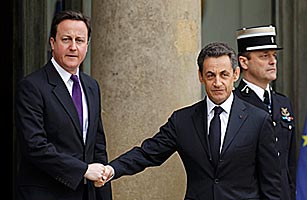
As the military action against Libya to give teeth to U.N. Security Resolution 1973 began, one question kept nagging away: Why, precisely, were the governments of Britain and France in the lead? Why were their armed forces taking part in the military action, and why had their diplomats done the grunt work in the negotiations that led to the adoption of Resolution 1973?
It is not an easy question to answer. British Prime Minister David Cameron said that the military action against Muammar Gaddafi was “necessary, it is legal and it is right.” Right, “because I don’t believe that we should stand aside while this dictator murders his own people.” French President Sarkozy said “If we intervene on the side of the Arab nations it is because of a universal conscience that cannot tolerate such crimes.” I’m not one of those cynics who assumes that such statements are devoid of content; in any event, they are grounded in language that was already quite condemnatory of Libya in Res. 1973. But the rhetoric doesn’t really answer the question: Why intervene?
Is what happens in Libya of direct national interest to Britain and France? To be sure, Libya is across the Mediterranean Sea from Europe, and its trade is directed mainly there. But Libya is a nation of only 6.5m people. For comparison, that is a bit more than El Salvador, a bit less than Honduras, and whatever happened in the Cold War, it is a while since U.S. policy makers have argued that what goes on in Central American nations is of such pressing national interest to the U.S. that it would legitimize armed intervention there.
Libya has oil and gas, yes — but less than 2% of the world’s oil reserves, while technology is about to make gas available in such abundance that it hardly matters which country has it. It’s hard to make the case that there is some pressing commercial reason for Britain and France to take the lead in the way that they have done, which will not stop those who see oil companies behind every foreign military adventure doing so.
Immigration? Yes, instability in the Maghreb tends to produce flows of migrants north. And in the case of Libya, even if those fleeing the fighting go first to Italy, they can make their way eventually to other nations of the European Union. But it’s pretty hard to imagine that there would be some unmanageable refugee crisis in North Africa if Muammar Gaddafi held on to power in Libya. The Mediterranean is a wide sea; it’s not a border that you can just walk across.